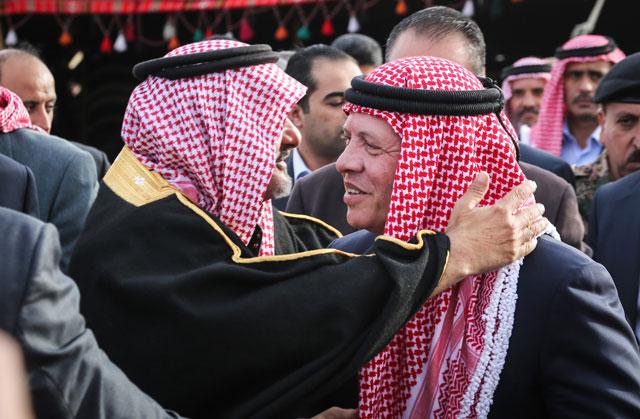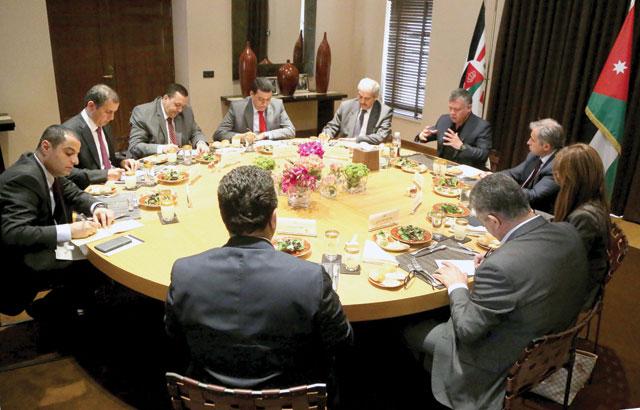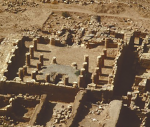You are here
Jordan’s role extends beyond its borders — His Majesty
By JT - Jan 21,2015 - Last updated at Jan 21,2015

AMMAN — His Majesty King Abdullah on Wednesday voiced his pride in the people of the Central Badia region, who "like all Jordanians, set an example of loyalty and sincere patriotism".
At a meeting with the leaders of the Bani Sakher tribe in Central Badia's Muwaqqar area, the King stressed that Jordan is capable of overcoming challenges facing it with the will of its dedicated people, according to a Royal Court statement.
"We are working day and night to improve the economic situation in Jordan," His Majesty said, voicing optimism for the future.
"Improving the living conditions of my people is at the top of all priorities, and we are all aware of the economic challenges facing us," he added, noting that poverty and unemployment will remain the "biggest challenge".
The King also spoke about the sacrifices Jordanians have made to defend the homeland and the nation.
He stressed that Muath Kasasbeh — the air force pilot detained by the so-called Islamic State group — belongs to the Arab Army, whose members have made sacrifices throughout history.
Urging patience, His Majesty said concerned parties are exerting intensified efforts to deal with Kasasbeh’s case, and called for letting “specialists do their job”.
The pilot was captured by the group, which controls large swathes of Syria and Iraq, last month when his plane went down in northeastern Syria.
King Abdullah commended the Jordan Armed Forces-Arab Army for its role in safeguarding the borders and ensuring the safety of the Kingdom and its citizens.
“The situation at the borders is safe and we are constantly working to protect them,” the statement quoted the King as saying.
Similarly, King Abdullah said: “Our political situation is very strong, and many countries need Jordan and its strength. Our role extends beyond our borders.”
During the visit, which is part of the King’s efforts to meet and communicate with local communities around Jordan, His Majesty directed the Royal Court to adopt several initiatives of priority to the region.
The initiatives include establishing health, education and vocational training projects in addition to supporting productive societies in the region.
The Monarch called for forming a committee of Central Badia residents to communicate with the Royal Court and discuss the region’s priorities and needs.
The King called for drawing up development initiatives to be based on proposals made by tribesmen, to materialise in programmes that can help create jobs for young men and women, and lead to focusing on vocational education to meet the labour market needs.
During the visit, the King strongly denounced any offence targeting Prophet Mohammad, noting that publishing any abusive drawings depicting the Prophet is denounced and is rejected by Muslims everywhere.
Moreover, the King said the ongoing war against terrorist groups is a pre-emptive one.
“We are taking part in it against extremists, in defence of Islam, and a comprehensive approach should be adopted to confront terrorism and extremism,” the King told tribal leaders.
This should cover military, security and ideological aspects, the King said, noting that this war concerns first and foremost Arabs and Muslims should take the initiative to support Islam and its message.
Regarding his participation in the January 11 Paris march against terrorism, the King said it was important for Arab and Muslim countries to take a clear stand on the issue and to stand with non-Muslims who support Muslim causes.
“We went there to stand against radicalism and extremism, and to stand by France as a friend of Jordan. More importantly, Jordan was there to stand by six million Muslims in France, which is the largest Muslim community in a European country,” the King said.
Moreover, King Abdullah stressed the need to create awareness in the Islamic world, reiterating that the abusive cartoons, depicting Prophet Mohammad, are not part of any freedoms, asserting that they are rejected and denounced.
Regarding the discussions that are taking place in the Islamic world and with foreigners on moderation and extremism, he said: “I am a Muslim and we are all Muslims, and extremists do not represent Islam. Our duty is to protect the reputation of Islam and Muslims.”
Also, the King stressed the importance of strengthening the coalitions against extremism, noting that there should be an Arab-Islamic coalition to confront terrorism, in which the international community would take part.
“If we want to build a political coalition against extremism, then it is not allowed to abuse any religion,” the King said, highlighting the Pope’s rejection of any insult to religious symbols.
The King noted what was witnessed in France recently was intended to augment hatred against Islam and Muslims, and this is part of the problem.
“Our duty is to protect the image of an Islam of moderation and tolerance, and this is the duty of everybody in all Arab and Islamic countries,” he said.
On the Middle East peace efforts, the King stressed that achieving peace and arriving at a just solution to the Palestinian cause represents the path for solving all regional issues.
He cautioned that failing to resolve the Palestinian issue would feed extremism.
He also stressed the importance of pursuing efforts to preserve the Islamic and Christian sites in Jerusalem, in line with the Hashemite custodianship of the holy places there.
“This is a duty and an honour and we are pursuing ahead in this direction.”
For their part, speakers at the event praised the King’s efforts to defend the true image of Islam, calling for reinforcing the internal front and standing behind the army.
They also presented a host of issues and demands related to the area, calling for upgrading their area to a governorate and establishing a hospital, a state university, vocational training facilities and youth centres, and improving the conditions of schools.
Former prime minister Faisal Al Fayez said in his remarks that strengthening the social fabric would shield Jordan against the repercussions of regional turmoil, stressing that Jordan has become a “state of law and institutions”.
A community leader, Jamal Khreisha, called for a solution to the issue of tribal wajihat, lands designated for tribal communities for grazing and farming since the Ottoman era, while Senator Mohammmad Zheir commended the reforms led by the King.
For his part, Miteb Zaben said that security of the homeland is the country’s top priority.
Brakat Zheir summed up the problems facing the area’s youth, citing unemployment among college graduates.
Other speakers underlined development programmes and luring investments to the area as an answer to the Central Badia’s woes.
Speakers at the meeting called for rehabilitating schools in the region, establishing more military schools and finding a solution to the sealing of artesian aquifers.
The badia leaders stressed the need to establish community colleges to provide qualitative vocational training programmes, calling for amending the civil service by-law to offer promotions for vocational and technical jobs.
Others said the region’s residents should reap the benefits of the development zone in Mafraq, noting that factories in the area should employ residents and implement corporate social responsibility activities.
Commending Jordan’s efforts to counter terrorism, the tribal leaders said experienced and learned imams should be instated at mosques to preach moderation, pointing out that several mosques are without imams.
Related Articles
His Majesty King Abdullah on Wednesday expressed pride in the residents of Southern Badia region, “who are a main component of the Jordanian national fabric”.
The international community continued on Wednesday to voice its outrage regarding the brutal killing of Jordanian pilot Muath Kasasbeh at the hands of the so-called Islamic State terrorist group.
His Majesty King Abdullah on Sunday said the fight against radicalism and terrorism will be a long-term effort which should be spearheaded by Muslim and Arab countries and supported by the international community, describing this endeavour as a third world war by other means.



















